Physician
On this page, you find all documents, package deals, and flashcards offered by seller PHYSICIAN.
- 2120
- 0
- 11
Community
- Followers
- Following
51 Reviews received
2147 items

/ NR507 Week 4 Midterm (Latest):
NR 507 Week 4 Midterm / NR507 Week 4 Midterm (Latest): 1. What is the final stage of the infectious process? Spread 2. Where in the respiratory tract do the majority of foreign objects aspirated by children finally lodge? Bronchus 3. What is the primary cause of respiratory distress syndrome (RDS) of the newborn? Surfactant deficiency 4. Which statement concerning benign tumors is true? The cells are well-differentiated. 5. Which compensatory mechanism is spontaneously used by ...
- Exam (elaborations)
- • 4 pages •
NR 507 Week 4 Midterm / NR507 Week 4 Midterm (Latest): 1. What is the final stage of the infectious process? Spread 2. Where in the respiratory tract do the majority of foreign objects aspirated by children finally lodge? Bronchus 3. What is the primary cause of respiratory distress syndrome (RDS) of the newborn? Surfactant deficiency 4. Which statement concerning benign tumors is true? The cells are well-differentiated. 5. Which compensatory mechanism is spontaneously used by ...
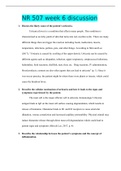
NR 507 week 6 discussion
NR 507 week 6 discussion 1. Discuss the likely cause of the patient’s urticaria. Urticaria (hives) is a condition that affects many people. This condition is characterized as an itchy patch of skin that turns into red, swollen welts. There are many different things that can trigger the reaction including foods, medication, insects, temperature, infections, pollens, pets, and other things. According to Shin and Lee (2017), "Urticaria is caused by swelling of the upper dermis. Urticaria can...
- Case
- • 3 pages •
NR 507 week 6 discussion 1. Discuss the likely cause of the patient’s urticaria. Urticaria (hives) is a condition that affects many people. This condition is characterized as an itchy patch of skin that turns into red, swollen welts. There are many different things that can trigger the reaction including foods, medication, insects, temperature, infections, pollens, pets, and other things. According to Shin and Lee (2017), "Urticaria is caused by swelling of the upper dermis. Urticaria can...
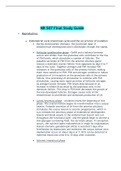
NR 507 Final Study Guide
NR 507 Final Study Guide • Reproductive: o Endometrial cycle (menstrual cycle) and the occurrence of ovulation During menstruation (menses), the functional layer if endometrium disintegrates and is discharges through the vagina. Follicular/proliferative phase - GnRH and a balance between activin and inhibin from the granulosa cells contribute to the rise of FSH levels, which stimulates a number of follicles. The pulsatile secretion of FSH from the anterior pituitary gland rescu...
- Case
- • 31 pages •
NR 507 Final Study Guide • Reproductive: o Endometrial cycle (menstrual cycle) and the occurrence of ovulation During menstruation (menses), the functional layer if endometrium disintegrates and is discharges through the vagina. Follicular/proliferative phase - GnRH and a balance between activin and inhibin from the granulosa cells contribute to the rise of FSH levels, which stimulates a number of follicles. The pulsatile secretion of FSH from the anterior pituitary gland rescu...

NR 507 Week 4 Midterm fall 2020
NR 507 Week 4 Midterm fall 2020 The coronary ostia are located in the: (Points : 2) Left ventricle Aortic valve Coronary sinus Aorta Where in the respiratory tract do the majority of foreign objects aspirated by children finally lodge? (Points : 2) Trachea Left lung Bronchus Bronchioles Which type of antibody is involved in type I hypersensitivity reaction? (Points : 2) IgA IgE ...
- Exam (elaborations)
- • 11 pages •
NR 507 Week 4 Midterm fall 2020 The coronary ostia are located in the: (Points : 2) Left ventricle Aortic valve Coronary sinus Aorta Where in the respiratory tract do the majority of foreign objects aspirated by children finally lodge? (Points : 2) Trachea Left lung Bronchus Bronchioles Which type of antibody is involved in type I hypersensitivity reaction? (Points : 2) IgA IgE ...
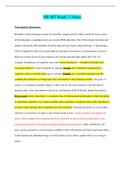
NR 507 Week 7: Notes
NR 507 Week 7: Notes Neurological Alterations: Disorders of the neurologic system are typically categorized into either central nervous system (CNS) disorders or peripheral nervous system (PNS) disorders. The CNS includes the brain and spinal cord and the PNS includes all of the other nervous tissue within the body. A functioning CNS is required in order for an individual to experience awareness or consciousness: however, there are various levels of consciousness and various disorders that imp...
- Class notes
- • 5 pages •
NR 507 Week 7: Notes Neurological Alterations: Disorders of the neurologic system are typically categorized into either central nervous system (CNS) disorders or peripheral nervous system (PNS) disorders. The CNS includes the brain and spinal cord and the PNS includes all of the other nervous tissue within the body. A functioning CNS is required in order for an individual to experience awareness or consciousness: however, there are various levels of consciousness and various disorders that imp...
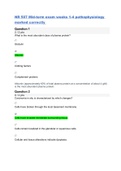
NR 507 Mid-term exam weeks 1-4 pathophysiology
NR 507 Mid-term exam weeks 1-4 pathophysiology marked correctly Question 1 2 / 2 pts What is the most abundant class of plasma protein? Globulin Albumin Clotting factors Complement proteins Albumin (approximately 60% of total plasma protein at a concentration of about 4 g/dl) is the most abundant plasma protein. Question 2 0 / 2 pts Carcinoma in situ is characterized by which changes? Cells have broken through the local basement membrane. ...
- Exam (elaborations)
- • 32 pages •
NR 507 Mid-term exam weeks 1-4 pathophysiology marked correctly Question 1 2 / 2 pts What is the most abundant class of plasma protein? Globulin Albumin Clotting factors Complement proteins Albumin (approximately 60% of total plasma protein at a concentration of about 4 g/dl) is the most abundant plasma protein. Question 2 0 / 2 pts Carcinoma in situ is characterized by which changes? Cells have broken through the local basement membrane. ...
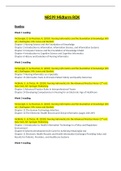
NR599 Midterm ROK
NR599 Midterm ROK Reading Week 1 reading: McGonigle, D. & Mastrian, K. (2018). Nursing informatics and the foundation of knowledge (4th ed.). Burlington, MA: Jones and Bartlett. Chapter 1 Nursing Science and the Foundation of Knowledge Chapter 2 Introduction to Information, Information Science, and Information Systems Chapter 3 Computer Science and the Foundation of Knowledge Model Chapter 4 Introduction to Cognitive Science and Cognitive Informatics Chapter 6 History and Evolution...
- Case
- • 4 pages •
NR599 Midterm ROK Reading Week 1 reading: McGonigle, D. & Mastrian, K. (2018). Nursing informatics and the foundation of knowledge (4th ed.). Burlington, MA: Jones and Bartlett. Chapter 1 Nursing Science and the Foundation of Knowledge Chapter 2 Introduction to Information, Information Science, and Information Systems Chapter 3 Computer Science and the Foundation of Knowledge Model Chapter 4 Introduction to Cognitive Science and Cognitive Informatics Chapter 6 History and Evolution...
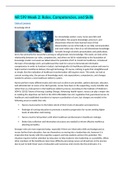
NR 599 Week 2: Roles, Competencies, and Skills
NR 599 Week 2: Roles, Competencies, and Skills • Table of Contents Knowledge Work As a knowledge worker, every nurse uses data and information. We acquire knowledge, process it, and disseminate what we have learned most of that dissemination occurs informally in our daily communication and work while only a few of us will disseminate knowledge formally through scholarly presentations and publications. And a few primarily the researchers among us will generate new knowledge. This week, we ...
- Case
- • 6 pages •
NR 599 Week 2: Roles, Competencies, and Skills • Table of Contents Knowledge Work As a knowledge worker, every nurse uses data and information. We acquire knowledge, process it, and disseminate what we have learned most of that dissemination occurs informally in our daily communication and work while only a few of us will disseminate knowledge formally through scholarly presentations and publications. And a few primarily the researchers among us will generate new knowledge. This week, we ...
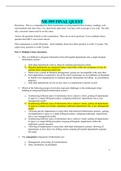
NR 599 FINAL QUESTIONS WITH ANSWERS( ALREADY GRADED )
NR 599 FINAL QUEST Directions: This is a comprehensive final examination covering material from lectures, readings, web sites handouts and class notes. It is open-book, open-note. You may work in groups if you wish. The only rule, everyone's name must be on the exam. Answer all questions directly on the examination. There are no trick questions. Every multiple-choice question has ONLY one correct answer. This examination is worth 250 points. Each multiple choice/true-false question is w...
- Exam (elaborations)
- • 13 pages •
NR 599 FINAL QUEST Directions: This is a comprehensive final examination covering material from lectures, readings, web sites handouts and class notes. It is open-book, open-note. You may work in groups if you wish. The only rule, everyone's name must be on the exam. Answer all questions directly on the examination. There are no trick questions. Every multiple-choice question has ONLY one correct answer. This examination is worth 250 points. Each multiple choice/true-false question is w...
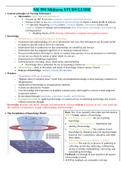
NR 599 Midterm STUDYGUIDE
NR 599 Midterm STUDYGUIDE 1. General principles of Nursing Informatics o Informatics: Turns data into information Focuses on HIT & involves computer, cognitive and social sciences Science of how to use data, information and knowledge to improve human health & delivery NI: specialty integrating nursing science, computer science, information science and cognitive science to manage and communicate data, information, knowledge, and wisdom in nursing practice. Building blocks ...
- Case
- • 6 pages •
NR 599 Midterm STUDYGUIDE 1. General principles of Nursing Informatics o Informatics: Turns data into information Focuses on HIT & involves computer, cognitive and social sciences Science of how to use data, information and knowledge to improve human health & delivery NI: specialty integrating nursing science, computer science, information science and cognitive science to manage and communicate data, information, knowledge, and wisdom in nursing practice. Building blocks ...

HESI PN EXIT EXAM 2020 WITH ANSWERS
ATI TEAS 7 Biology Review
Well explained questions and clear diagrams... very helpful
NURS 6630 Week 6 Midterm Exam Answers
Fundamentals HESI Questions
MENTAL_HEALTH_2. | LATEST ANSWERS